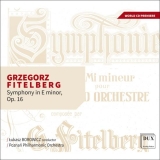Grzegorz Fitelberg (1879-1953), nicht zu verwechseln mit seinem Sohn Jerzy Fitelberg, war in seiner langen Karriere zunächst als Geiger und Dirigent tätig. Er flüchtete 1939 nach Paris, dann nach Buenos Aires, wo er als Dirigent am Teatro Colón arbeitete. Die nächsten Kriegsjahre verbrachte er in den USA.
1946 kehrte er nach Europa zurück und übernahm die Leitung des Großen Polnischen Radiosinfonieorchesters in Katowice, wo er sich sehr für junge Komponisten einsetzte, obschon er selber in Traditionalist war. Witold Lutoslawski sagte von ihm: « Für die junge polnische Musik war Fitelberg eine wahre Propaganda-Institution, ohne die es für die Schöpfer damals schwierig gewesen wäre, ihre Talente zu entwickeln und die notwendigen Erfahrungen zu sammeln. »
Die Symphonie, hier in Welt-Ersteinspielung zu hören, ist Musik, die mit Herzblut geschrieben wurde. Das Werk zeichnet sich durch eine wunderbare Instrumentation, vor allem aber eine blühende Vielfalt von Motiven und Melodien aus. Gleich der erste Satz ist von überschwänglicher Opulenz und einer phänomenalen Farbenvielfalt. Das liebliche Andante ist wunderbar lyrisch, während das Scherzo von Energie und Melodien nur so strotzt, Das Finale ist beschwingt und beschließt die Symphonie mit hymnischem Jubel.
Lukasz Borowicz und das Orchester aus Poznan lassen sich von der Kraft dieser Musik anstecken und bringen die Symphonie virtuos und mit höchsten Schliff zur Aufführung. Die Interpretation ist zügig, dramatisch transparent und leuchtend, mit warm gefärbten Melodiebögen.
Borowiczs emphatischer Ansatz sorgt für eine beeindruckende Wiedergabe, die zeigt, wie kraftvoll dieses Stück wirken kann, wenn es derart engagiert aufgeführt wird.
Grzegorz Fitelberg (1879-1953), not to be confused with his son Jerzy Fitelberg, initially worked as a violinist and conductor during his long career. He fled to Paris in 1939, then to Buenos Aires, where he worked as a conductor at the Teatro Colón. He spent the next few years of the war in the USA.
He returned to Europe in 1946 and became chief conductor of the Polish Radio Symphony Orchestra in Katowice, where he was a great advocate of young composers, even though he himself was a traditionalist.
Witold Lutoslawski said of him: « Fitelberg was a true propaganda institution for young Polish music, without which it would have been difficult for the creators to develop their talents and gain the necessary experience. »
The symphony, heard here in its world premiere recording, is music that was written with heart and soul. The work is characterized by wonderful orchestration, but above all by a flourishing variety of motifs and melodies. The very first movement is of exuberant opulence and a phenomenal variety of colors. The lovely Andante is wonderfully lyrical, while the Scherzo is bursting with energy and melodies. The finale is exhilarating and concludes the symphony with hymn-like jubilation.
Lukasz Borowicz and the orchestra from Poznan are infected by the power of this music and perform the symphony with virtuosity and the highest polish. The interpretation is brisk, dramatically transparent and luminous, with warmly colored melodic arcs.
Borowicz’s emphatic approach makes for an impressive performance that shows how powerful this piece can be when performed with such commitment.
























